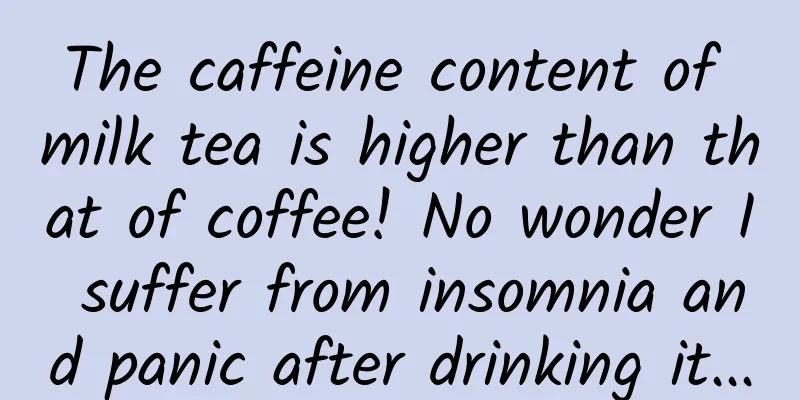The caffeine content of milk tea is higher than that of coffee! No wonder I suffer from insomnia and panic after drinking it...

|
In recent years, milk tea has become more and more popular, and various Internet-famous milk teas seem to have become the "life-saving happy water" for more and more young people. However, many people don’t know that although milk tea tastes good, the caffeine content in it may be higher than that of coffee, and drinking it may cause insomnia. How much caffeine is in milk tea? How much caffeine is in a cup of milk tea? Some people may have seen this statement on the Internet: A cup of milk tea has the same caffeine content as 7 cans of Red Bull; The caffeine content of a cup of milk tea is equal to that of 4 cups of coffee; If you drink the cup of milk tea with the most caffeine, it is equivalent to drinking 4 cups of coffee, or 8 cans of Red Bull; … Let me first state the conclusion: there is basically no problem with the above statement, the caffeine content in milk tea is indeed higher than that in coffee. In 2017, the Shanghai Consumers Association conducted a random inspection of milk tea, and the test results found that 51 varieties of milk tea from 27 milk tea shops all contained a lot of caffeine. Among all samples, the average caffeine content per cup was 270mg, and the highest was 480mg, which is basically equivalent to 4 cups of coffee or 8 cans of Red Bull. You should know that the caffeine content of a cup of American coffee (medium cup) is only 108mg; the caffeine content of a can of Red Bull is only 50mg. In 2019, the Shenzhen Guangming District Consumer Council and the Shenzhen Food and Drug Safety Volunteer Service also tested 10 brands of pearl milk tea on the market. The results showed that all milk teas contained caffeine, with an average content of 258 mg/kg. Among them, the highest caffeine content was 522 mg/kg, which is equivalent to the total amount of caffeine in 7 cans of Red Bull. Copyright images in the gallery. Reprinting and using them may lead to copyright disputes. Why is there caffeine in milk tea? This is because milk tea is made of "milk + tea", and tea contains caffeine. The caffeine content in each gram of tea is generally around 20 mg, and can be as high as 40 mg. When brewing tea, caffeine is easily dissolved from the tea leaves into the water. It is worth noting that many milk teas on the market are directly made from concentrated tea powder, so the caffeine content is usually higher. According to the results of "Dietary Caffeine Intake Levels and Risk Assessment of Chinese Residents", in my country, for adult consumers, the highest contribution rates to caffeine intake are tea, tea beverages, milk tea and coffee, respectively; while for minors, the highest contribution rates to caffeine intake are milk tea, tea beverages, tea and chocolate, respectively. In other words, whether adults or children, when drinking milk tea, they must pay attention to the caffeine intake, and never think that there is no caffeine in it. Why do some people drink milk tea? Will you stay awake until dawn? Many people say that drinking a cup of milk tea will cause them to suffer from insomnia and sleep poorly, and some even say that a cup of milk tea can keep them awake until dawn. This is because caffeine has a stimulating effect on the central nervous system. Many people will feel very excited and unable to sleep after drinking it. Some people who are sensitive to caffeine may not even be able to sleep all night after drinking a cup of milk tea. However, the refreshing and stimulating effects of caffeine vary greatly among different people. Because there are some genes in our body, such as CYP1A2, PDSS2, etc., which control the metabolism of caffeine. People with more active genes metabolize caffeine faster, and the caffeine they ingest will be cleared out of the body quickly, so drinking a few cups of milk tea will not affect sleep at all, and you will even feel sleepy after drinking milk tea. But some people's coffee metabolism genes are weak, and it takes a long time to metabolize even a little caffeine. Even the coffee you drink in the morning is still dancing in your brain at night, but a cup of milk tea can wake you up until dawn. Copyright images in the gallery. Reprinting and using them may lead to copyright disputes. Is the caffeine in milk tea safe? What everyone is most concerned about is whether the caffeine in milk tea is safe and whether it will cause harm to the human body. According to current research, it is safe for normal people to consume caffeine in moderation. The US FDA, the EU EFSA, the Canadian Health Department (HealthCanada) and other health agencies all believe that for healthy adults, it is safe to consume no more than 400 mg of caffeine per day. According to the results of the "Chinese Residents' Dietary Caffeine Intake Level and Risk Assessment", it is safe for adults to drink up to 1524g of liquid milk tea per day and not consume other caffeinated foods. Therefore, for normal people, one cup a day is completely fine. Special reminder: teenagers and pregnant women are more sensitive to caffeine, and they are generally not encouraged to consume caffeine. So, if you are a teenager, or you are pregnant or breastfeeding, try not to drink it. In addition, some people may be more sensitive to caffeine and may experience insomnia, trembling hands and feet, palpitations, sleeplessness and other symptoms after drinking it, so it is best not to drink it first. Can I drink milk tea without worry? The caffeine in a cup of milk tea is usually not a problem, so friends who like to drink milk tea can rest assured. However, in addition to milk tea, many foods/drinks in life also contain caffeine, such as cola, tea, coffee, certain energy drinks, and chocolate. If you drink these drinks and eat chocolate, remember to drink less milk tea. Copyright images in the gallery. Reprinting and using them may lead to copyright disputes. Moreover, everyone's tolerance to caffeine is different. Some people can drink several cups of milk tea + coffee without any problem, but some people feel uncomfortable after just a few sips. Therefore, it is recommended that you follow your own feelings. If you experience insomnia, anxiety, palpitations, tremors, stomach discomfort, increased heart rate, headaches, nausea, irritability and other discomforts after drinking milk tea, it means that you may have exceeded your caffeine tolerance and should make appropriate adjustments - drink less. In addition, the biggest health problem of milk tea is that it contains too much sugar and fat. Many delicious milk teas are added with a lot of cream, and fat is definitely indispensable. The fat content in a cup of milk tea can usually be as high as 40 to 70 grams, and the sugar content in a cup of pearl milk tea is between 30 and 60 grams. Everyone must pay attention to controlling the amount of milk tea you drink, otherwise, you will only get fatter and fatter... References [1] China Food and Nutrition Information Exchange Center, Institute of Nutrition and Health, Chinese Center for Disease Control and Prevention, Health Communication Branch of Chinese Preventive Medicine Association, etc. Scientific consensus on coffee and health [J]. Chinese Journal of Preventive Medicine, 2018(11). DOI:10.3760/cma.j.issn.0253-9624.2018.11.004. [2] National Food Safety Risk Assessment Center. “Dietary caffeine intake levels and risk assessment of Chinese residents” [3] Scientific Opinion on the safety of caffeine - EFSA [4] National Food Safety Risk Assessment Center. 0. Dietary intake level of trans fatty acids among Chinese residents and its risk assessment Author: Ruan Guangfeng, Deputy Director of Kexin Food and Health Information Exchange Center Audit丨Gu Chuanling Director of Capital Health Nutrition and Gourmet Society Registered Nutritionist Dietetics Expert of Public Security Border Defense Force |
>>: He searched the Pan-Himalayan region to find the grass for the lamb chops.
Recommend
5 steps for integrated marketing promotion across the entire network, this is the normal approach!
As the company develops and its market share incr...
The 2016 first half of the year App Comprehensive Strength Ranking (the most beautiful on the entire network) Are you on the list today?
I examine myself three times a day: Have you comp...
How to deal with the situation when there are only a few APP downloads per day
If your app has been launched and follows the fol...
The Bear Paw uses its ultimate move! Authoritative Q&A function brings TOP1 search ranking benefits
In this era of information explosion, how can bran...
Qvod server stores more than 3,000 pornographic videos
According to Xinhua News Agency, the National Offi...
The "sea bells" on the bottom of the South China Sea are actually used to capture cosmic ghost messengers!
For hundreds of years, scientists have used teles...
WeChat finally supports multiple devices online at the same time, but users are not happy with it
WeChat 8.0.8 finally supports multiple devices lo...
Can you eat it after thawing? It turns out that Arctic sweet shrimp are cooked before landing!
Review expert: Ran Hao, a well-known popular scie...
Theoretical basis for improving your App startup speed
1. To do a good job, you must first sharpen your ...
WeChat used car mini program function, how much does it cost to develop a used car trading mini program?
With the rise of "new energy" vehicles, ...
The most comprehensive APP operation and promotion plan!
"I recently published an article [How much d...
Google scandal: Android secretly collects rival APP data to help its own competitors
[[334870]] Android, developed by Google, is the w...
Wu Hequan, Academician of the Chinese Academy of Engineering: In the next ten years, we will be in the "new Internet era"
As an important part of the 2025 Zhongguancun For...
A complete collection of online marketing videos for 19.9 yuan: including SEO, SEM, website building, website imitation, and online marketing promotion worth 20,000 yuan!
Learning materials worth 20,000 only cost 19.9 yu...
Why did Geely's new energy vehicles only rank tenth in sales last year and most of them were sold domestically?
New energy vehicles are the general trend. Both t...









